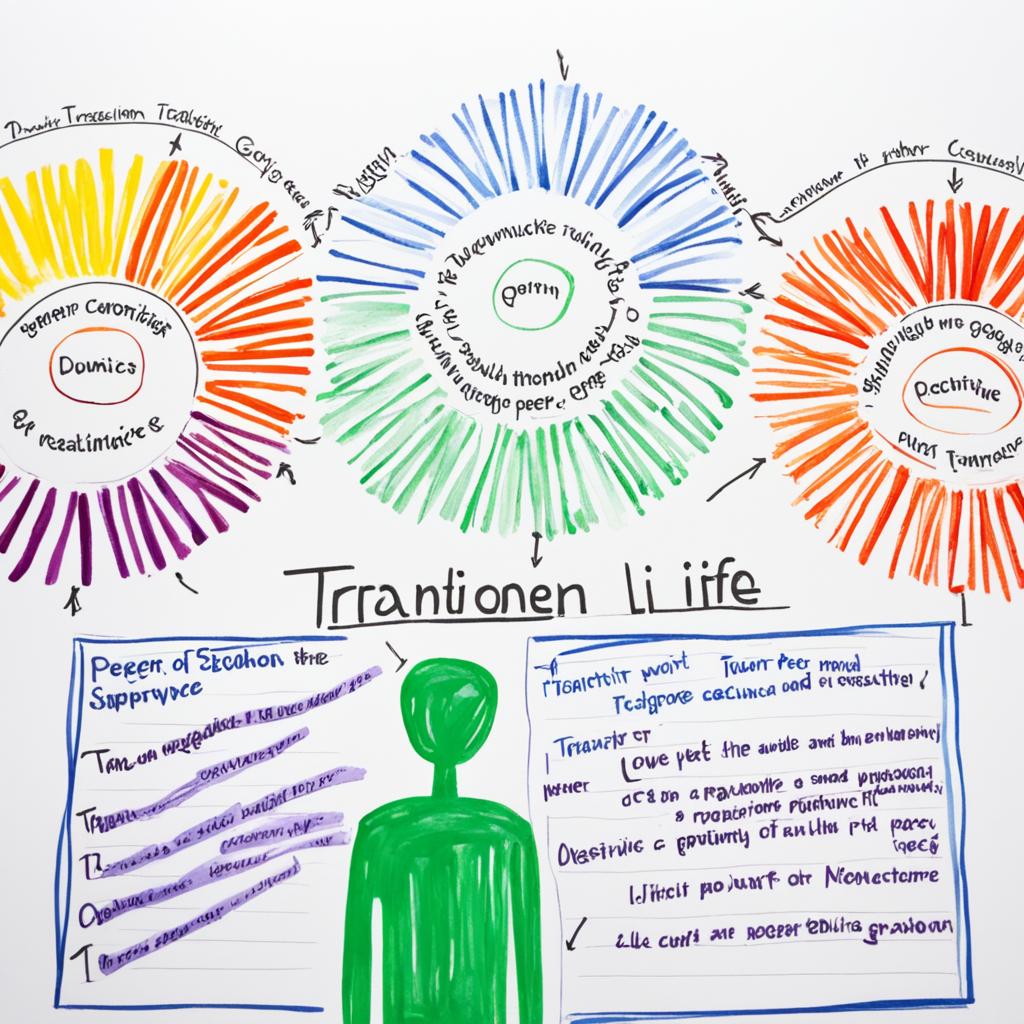Parenthood is a cornerstone of society, shaping the next generation and the world they inherit. However, did you know that childhood experiences have a profound impact on adult behavior? Research shows that our early years play a significant role in developing our personality, shaping our coping mechanisms, and influencing our relationships.
Understanding the link between childhood experiences and adult behavior is crucial for creating a healthier and more fulfilling life. In this article, we will explore how our early attachments, parenting styles, traumatic experiences, and social influences all contribute to shaping who we become as adults.
Let’s delve into the fascinating world of childhood experiences and discover how they leave a lasting imprint on our lives.
Understanding Childhood Development
Childhood development plays a fundamental role in shaping who we become as adults. The early experiences we have during our formative years lay the foundation for our cognitive, emotional, and social development. These critical aspects of childhood development significantly influence our behavior and interactions throughout our lives.
When it comes to cognitive development, children’s brains are like sponges, absorbing information and making connections at an astonishing rate. Early experiences provide the building blocks for cognitive abilities such as problem-solving, memory, and language development. Stimulating environments and positive interactions with caregivers foster healthy brain development, enabling children to reach their full potential.
The emotional domain of childhood development encompasses the ability to recognize and manage emotions, as well as empathize with others. Early experiences that promote emotional well-being, such as secure attachments with caregivers, contribute to the development of healthy emotional regulation. Conversely, negative experiences can lead to emotional difficulties later in life, impacting our relationships and overall emotional well-being.
The social element of childhood development focuses on learning how to navigate social interactions, build relationships, and understand societal norms. From early interactions with family members to peer relationships, these social experiences shape our ability to communicate effectively, cooperate with others, and establish meaningful connections. Positive social experiences in childhood foster healthy social skills and promote positive relationships in adulthood.
“Childhood is a time of rapid growth and development. It is during these early years that the cognitive, emotional, and social foundations are laid, setting the stage for future growth and well-being.” – Dr. Maria Montessori
Understanding the importance of childhood development is crucial for parents, caregivers, and educators. By providing enriching experiences that promote cognitive, emotional, and social growth, we can create a solid foundation for healthy adult behavior. Recognizing and addressing any developmental gaps or challenges early on ensures that children have the best opportunity to reach their full potential.
Next, we will delve deeper into the role of attachment in childhood development and its impact on adult behavior.
The Role of Attachment
Attachment theory, developed by psychologist John Bowlby, explores the influence of early bonds on human development. It suggests that the quality of parental bonds during childhood significantly affects adult behavior and relationships.


Attachment styles, categorized as secure and insecure, play a vital role in forming relationships and coping with emotions. Securely attached individuals tend to have positive views of themselves and others, trust easily, and effectively navigate stress and conflict.
“Secure attachment provides a safe base from which individuals can explore the world and develop healthy social and emotional skills.”
In contrast, insecure attachment can lead to difficulties in relationships and emotional regulation. Anxious or ambivalent attachment may result in excessive dependence on others and constant fear of rejection. Avoidant attachment can manifest as emotional distance and an aversion to intimacy.
The Impact of Parental Bonds
Parental bonds contribute significantly to the development of attachment styles. Securely attached infants typically have caregivers who are responsive, consistent, and nurturing. In contrast, inconsistent or neglectful parenting can contribute to insecure attachment.
- Secure attachment is associated with a greater likelihood of forming healthy and satisfying relationships in adulthood.
- Insecure attachment, on the other hand, may increase the risk of difficulties in relationships, emotional regulation, and coping mechanisms.
Understanding attachment theory can provide insights into how childhood experiences shape adult behavior and relationships. By recognizing the impact of parental bonds, individuals can work towards developing secure attachment in their relationships and improving their emotional well-being.
Impact of Parenting Styles
Parenting styles play a crucial role in shaping adult behavior. The way parents interact with their children can have a profound impact on their personality development and coping mechanisms in later life. In this section, we will discuss the various parenting styles and their influence on adult behavior.
Authoritative Parenting
Authoritative parenting is characterized by a balance between setting clear rules and expectations while also being nurturing and responsive to the child’s needs. Parents who adopt this style provide guidance and discipline while also encouraging independence and individuality. Research suggests that individuals raised in authoritative households tend to develop better social skills, self-esteem, and problem-solving abilities.
Permissive Parenting
Permissive parenting involves low levels of discipline and control, with parents being highly indulgent and lenient. These parents may avoid setting boundaries and rules, often believing in the importance of the child’s freedom and autonomy. While this style may create a warm and accepting environment, it can lead to difficulties in self-discipline, self-regulation, and accountability in adulthood.
Authoritarian Parenting
Authoritarian parenting is characterized by strict rules, high expectations, and little room for negotiation. Parents who adopt this style often emphasize obedience and respect for authority. While the discipline and structure provided by authoritarian parents may result in high achievement and compliance, it may also lead to lower self-esteem, poor decision-making skills, and difficulties in forming healthy relationships.
Neglectful Parenting
Neglectful parenting, also known as uninvolved parenting, refers to a lack of emotional involvement and parental support. Parents who display this style may be indifferent, neglecting their child’s needs and failing to provide guidance or supervision. Neglectful parenting can result in significant emotional and behavioral issues, including low self-esteem, difficulties with trust and attachment, and a higher risk of engaging in risky or delinquent behaviors.
Understanding the impact of parenting styles on adult behavior is crucial for individuals seeking to improve their own parenting practices or overcome the challenges associated with their upbringing. By recognizing the strengths and weaknesses of different parenting styles, we can strive to create a nurturing and supportive environment that fosters healthy development and positive outcomes in adulthood.


Traumatic Experiences
Childhood trauma can have profound and long-lasting effects on adult behavior. When individuals experience trauma during their formative years, it can shape their psychological and emotional well-being in significant ways. One of the most common long-term effects of childhood trauma is the development of post-traumatic stress disorder (PTSD), a condition characterized by intrusive memories, avoidance of trauma-related stimuli, negative changes in mood and cognition, and alterations in arousal and reactivity.
The impact of childhood trauma on relationships cannot be underestimated. Adults who have experienced trauma in their early years may struggle with trust, intimacy, and emotional regulation, making it challenging to form and maintain healthy relationships. Childhood trauma can also contribute to difficulties in establishing boundaries and communicating effectively, further straining interpersonal connections.
Coping strategies are essential for navigating the challenges that come with surviving childhood trauma. Unfortunately, individuals who have experienced trauma may develop maladaptive coping mechanisms as a means of managing their distress. These coping strategies, such as substance abuse, self-harm, or avoidance, can perpetuate a cycle of unhealthy behaviors and hinder personal growth and healing.
Childhood trauma affects not only the individual’s mental and emotional well-being but also their physical health. It can increase the risk of various health conditions, including cardiovascular disease, diabetes, and autoimmune disorders. The pervasive and lasting effects of trauma highlight the urgent need for intervention and support for those who have experienced childhood trauma.
Recognizing the signs and symptoms of childhood trauma is crucial in order to provide appropriate support and resources. Early intervention, therapy, and trauma-informed care can play a significant role in helping individuals heal from their traumas and develop healthier coping mechanisms. It is essential to create a safe and nurturing environment where individuals feel empowered to address their past traumas and embark on a journey of healing and recovery.


Influence of Siblings
Siblings play a significant role in shaping adult behavior and development. The unique dynamics within sibling relationships, combined with the influence of birth order, contribute to an individual’s personality, social skills, and overall outlook on life.
Research has shown that siblings can have a profound impact on each other’s lives. They often serve as companions, role models, and sources of support throughout childhood and beyond. Sibling relationships provide opportunities for social interaction, conflict resolution, and the development of essential interpersonal skills.
Birth order, or the order in which siblings are born into a family, is another influential factor. Firstborns, middle children, and youngest siblings may have distinct experiences and responsibilities, which can shape their personality traits and behaviors. Firstborns, for example, tend to be responsible, achievement-oriented, and organized, while youngest siblings may develop a more relaxed and outgoing nature.
It is important to note that the influence of siblings is not solely determined by birth order. The quality of the sibling relationship, including factors such as closeness, rivalry, and communication, also plays a significant role. Positive sibling relationships characterized by warmth, empathy, and cooperation can promote healthy emotional development and resilience.
The Role of Siblings in Personality Development
“Sibling relationships are like no other. They are a unique blend of friendship, rivalry, and unconditional love. Siblings shape each other’s personalities in ways that no other relationship can.”
Siblings contribute to the formation of an individual’s personality through various mechanisms. They act as mirrors, providing feedback and validation, which helps shape self-perception and self-esteem. Siblings also introduce new ideas, perspectives, and experiences, fostering intellectual curiosity and developing social skills.
Furthermore, sibling relationships offer opportunities to learn conflict resolution, negotiation, and compromise, key skills that are applicable throughout life. Through the give-and-take of sibling interactions, individuals learn to navigate differences, solve problems, and develop resilience in the face of adversity.
The influence of siblings extends beyond childhood. Adult sibling relationships can continue to impact behavior, providing emotional support, and acting as a bridge to family history, traditions, and cultural values.


Understanding the influence of siblings on adult behavior is essential for individuals, parents, and professionals alike. Recognizing the significance of birth order, fostering positive sibling relationships, and promoting healthy communication and conflict resolution skills can contribute to the development of well-adjusted adults who thrive in their personal and professional lives.
Siblings have the power to shape our lives, leaving a lasting impact on our beliefs, values, and interpersonal skills. By acknowledging and understanding the influence of siblings, we can better navigate sibling dynamics and cultivate stronger, more meaningful relationships with our brothers and sisters.
Peer Influence
During childhood, the influence of peers plays a significant role in shaping adult behavior. Childhood friendships provide a foundation for social interactions and can greatly impact an individual’s values, beliefs, and choices as they grow older. Peer pressure is a common phenomenon that arises from these friendships, where individuals may feel compelled to conform to the behaviors and attitudes of their peers.


Conformity, the tendency to adjust one’s behavior or beliefs to match those of the group, is another effect of peer influence. Children may conform to social norms established by their peers in order to fit in or gain acceptance. This desire for acceptance can persist into adulthood, leading individuals to adhere to societal expectations even if they may not align with their personal values.
It is important to note that peer influence can have both positive and negative effects on adult behavior. Positive peer influence can encourage individuals to engage in healthy behaviors and pursue their goals. On the other hand, negative peer influence, such as engaging in risky behaviors or adopting unhealthy habits, can have detrimental consequences.
Understanding the impact of peer influence on adult behavior is crucial in promoting positive development and well-being. By fostering healthy childhood friendships and teaching children critical thinking and decision-making skills, parents and educators can help children navigate peer pressure and make independent choices that align with their values.
Cultural and Societal Factors
When examining the factors that shape adult behavior, it is crucial to consider the profound influence of cultural and societal factors. These elements play a significant role in shaping our personalities, coping mechanisms, and relationships.
Cultural factors encompass the shared beliefs, values, traditions, and norms within a particular society or community. These cultural elements provide a framework for individuals to navigate their social environment and shape their behavior accordingly. Cultural norms set expectations for how individuals should conduct themselves, interact with others, and adhere to societal rules.
Societal influences, on the other hand, are broader and encompass the collective impact of cultural, economic, political, and historical factors that shape a society. These influences shape our perception of what is considered acceptable or unacceptable behavior, impacting our attitudes, values, and expectations.
“Our behavior is often a reflection of the cultural and societal expectations we internalize.”
The expectations placed upon individuals, whether consciously or unconsciously, can greatly impact their behavior. These expectations may be related to aspects such as gender roles, work ethic, or family dynamics. For example, in some cultures, there may be societal pressure for individuals to prioritize their familial responsibilities over personal aspirations, leading to different choices and priorities.
Additionally, cultural and societal factors shape the coping mechanisms individuals develop when faced with challenges or stressors. Norms around emotional expression, seeking support, and problem-solving vary across cultures and societies. These factors influence how individuals navigate difficult situations, manage their emotions, and seek assistance, impacting their overall well-being.
It is essential to be aware of the influence of cultural and societal factors on adult behavior. Recognizing these influences can help individuals better understand themselves and others, fostering empathy and cultural competence. By appreciating the diverse array of cultural norms, values, and expectations, we can create more inclusive and supportive environments that celebrate our differences while promoting respect and understanding.
Image for Reference
Resilience and Overcoming Adversity
Adversity is an intrinsic part of life, and children often encounter various challenges that can significantly impact their development. However, it is through resilience that they learn to overcome these obstacles and grow personally. Resilience is the ability to navigate adversity, adapt to change, and bounce back stronger.
Children who develop resilience are better equipped to face the challenges of adulthood. They develop a sense of self-efficacy and belief in their abilities to overcome obstacles, leading to improved coping mechanisms and personal growth. Resilience fosters resilience, creating a positive cycle that helps individuals navigate future adversities.
Overcoming challenges during childhood is vital in building resilience. It helps children develop essential skills such as problem-solving, emotional regulation, and social competence. These skills not only benefit their immediate well-being but also have long-lasting effects on their adult behavior and relationships.
Resilience is not innate; it can be cultivated and nurtured through various means. Supportive relationships with parents, caregivers, and mentors play a crucial role in fostering resilience. By providing a safe and nurturing environment, adults can help children develop the necessary skills and mindset to overcome adversity.
“Resilience is the capacity to recover quickly from difficulties. It is born out of belief, perseverance, and a deep desire for personal growth.” – Michelle Obama
In addition to supportive relationships, exposure to manageable challenges and opportunities for problem-solving can help children build resilience. By encouraging children to take on age-appropriate tasks and allowing them to make mistakes, adults empower them to develop resilience and learn from their experiences.
Resilience also thrives in a supportive community. Schools, organizations, and communities that prioritize emotional well-being and offer resources and support systems can significantly contribute to resilience-building. Collaborative efforts involving educators, mental health professionals, and community leaders can create an environment conducive to resilience and personal growth.
Fostering resilience:
- Encourage problem-solving and critical thinking skills
- Promote emotional regulation and self-awareness
- Provide opportunities for decision-making and autonomy
- Foster supportive relationships and mentorship
- Cultivate a growth mindset and positive thinking
- Offer resources and support systems
Resilience is a crucial asset that empowers individuals to overcome challenges, adapt to change, and thrive in the face of adversity. By nurturing resilience during childhood, we can shape healthier, more resilient adults who are better equipped to navigate life’s ups and downs.
Breaking the Cycle
The Power of Addressing Childhood Experiences
One of the most significant challenges individuals face is breaking free from negative generational patterns that can perpetuate across families. However, there is hope. By acknowledging and addressing childhood experiences through therapy, individuals can actively work towards altering their adult behavior and creating healthier dynamics within their families.
Breaking the cycle starts with introspection – taking an honest look at one’s upbringing and the impact it has had on personal beliefs and behaviors. Recognizing the generational patterns that have influenced parenting styles, coping mechanisms, and relationship dynamics is the first step towards breaking free from their grasp.
“The definition of insanity is doing the same thing over and over again, but expecting different results.” – Albert Einstein
Conscious parenting plays a crucial role in breaking the cycle. By gaining awareness of their own triggers, parents can actively choose to respond differently to challenging situations and provide a nurturing environment that nurtures emotional well-being.
Therapy is a valuable resource in this journey of breaking free. Through therapy, individuals can gain a deeper understanding of the unconscious patterns and traumas that may be perpetuating negative generational cycles. By exploring these experiences and processing the associated emotions, individuals can free themselves from the grip of the past and build healthier relationships.
Breaking the cycle goes beyond individual healing – it creates a ripple effect that positively influences future generations. By breaking the chains of negative generational patterns, individuals can provide their children with healthier foundations, contributing to a cycle of well-being and resilience.
Integrating Therapy into Parenting
Therapy can equip parents with the necessary tools to navigate challenges from a place of understanding and empathy. It provides strategies for improving communication, setting boundaries, and fostering emotional regulation, creating a more secure and loving parenting environment.
When parents prioritize their mental health and engage in therapy, they model healthy behavior to their children. This modeling not only helps break the cycle of negative patterns but also equips the next generation with the skills needed to navigate their own lives more effectively.
With introspection, conscious parenting, and therapy, individuals can take empowered steps towards breaking the cycle of negative generational patterns. By rewriting the narrative, individuals have the opportunity to shape their own lives and create positive change that spans across generations.
The Role of Education and Intervention
Education and intervention play a crucial role in identifying and addressing negative childhood experiences. By providing the necessary knowledge and resources, early detection and prevention can significantly impact the long-term well-being of individuals.
Education is key to understanding the signs and effects of adverse childhood experiences. By increasing awareness among parents, educators, and the community, we can create a supportive environment that fosters intervention and healing. Through workshops, seminars, and informative materials, individuals can learn how to identify and respond to potential risk factors, gaining the tools needed to protect children from harm.
Intervention is a proactive approach that aims to intervene during critical stages of development. Early identification of adverse experiences allows for timely support and the implementation of suitable coping strategies. It enables professionals to provide therapeutic interventions that address emotional, psychological, and behavioral challenges, promoting resilience and healthy child development.
By emphasizing early detection, we ensure timely intervention to mitigate the impact of negative experiences. Identification through screenings, assessments, and observation in educational settings, healthcare facilities, and community organizations can help identify at-risk individuals and provide appropriate support. The collaboration between different sectors, such as educators, healthcare providers, and social workers, is vital in creating a comprehensive system for early detection.
Early intervention is essential. The earlier we intervene, the greater the potential for positive outcomes. By providing the necessary support and resources to children and their families, we can help break the cycle of adversity and create a path towards brighter futures.
Prevention goes hand in hand with education and intervention. By addressing risk factors, strengthening protective factors, and promoting healthy relationships, we can create an environment that reduces the likelihood of negative experiences. Prevention initiatives can include parenting programs, community support networks, and policies that prioritize the well-being of children.
It is essential to remember that effective education and intervention require collaboration and support from all stakeholders. Governments, organizations, communities, families, and individuals must work together to create a society that prioritizes the safety and well-being of children.
Through education, intervention, early detection, and prevention, we can create a world where every child has the opportunity to grow and thrive, free from the burdens of adverse childhood experiences. Together, let’s build a brighter future for the next generation.
Conclusion
To better understand adult behavior, it is essential to recognize the profound impact of childhood experiences. Throughout this article, we have explored how childhood events shape personality, influence coping mechanisms, and impact relationships.
Attachment styles, parenting styles, traumatic experiences, sibling influence, and peer pressure all contribute to the complex interplay between childhood and adult behavior. However, it is crucial to remember that childhood does not dictate destiny.
By understanding and addressing childhood trauma, fostering resilience, and breaking negative generational patterns, individuals can overcome adversity and achieve healthier adult outcomes. Education, early intervention, and therapy play vital roles in supporting individuals in this journey. Together, we can create a future where childhood experiences do not limit potential, but instead, become opportunities for growth and personal development.
